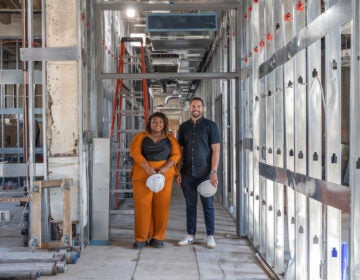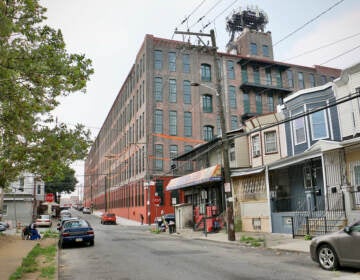SugarHouse: nod for more time, new plan
May 6
By Kellie Patrick Gates
For PlanPhilly
The Pennsylvania Gaming Control Board today approved SugarHouse’s new design and extended the casino’s opening deadline by two years.
The Board voted unanimously after about two hours of testimony from SugarHouse and the public and an hour of deliberations. Watch the vote. About 400 people had packed room 204A in the Pennsylvania Convention Center, many of them union members or neighborhood activists.
“We’re very pleased with the decision, and we’re gonna go to work,” said a smiling Neil Bluhm, SugarHouse’s chief investor, shortly after the vote. See his reaction. Project manager Terry McKenna said he expected to have all city and state permits needed to construct the interim facility in hand by mid-summer. Bluhm said the interim casino would be open in about 13 months.
During testimony, the board asked several questions related to financing, and the conditions attached to the approval reflected that. SugarHouse must provide monthly statements to the board about financing, license and permits. It must also submit all financing statements and a detailed project timeline to the board’s Bureau of Investigation and Review.
Bluhm told the board he was “confident” that despite the current economic climate, SugarHouse will be able to get the funding it needs to build the interim casino. But, “We can’t guarantee this financing. In this market, no one knows what can happen,” he said.
Bluhm said he’s optimistic about financing for the interim facility for two reasons: The SugarHouse team has $160 million in equity investment in the project – more than double the $140 million they will need to borrow. SugarHouse is projecting the interim facility will yield between $60 and $70 million in cash flow, and while banks are no longer willing to loan upwards of four times cash flow, they’ll still loan 2.5 times that amount.
He’s talked to several banks, and told the Board he expected commitments once the Gaming Control Board and City Council approvals were in hand. Watch Bluhm’s testimony: Part I, a status report, Part II, financing, and Part III, what happens after the interim casino.
Board Chairman Mary DiGiacomo Colins was the only member who commented before the vote. She said she believed SugarHouse met its statutory requirements for an extension, and said the project is “financially suitable and feasible.”
Matt Ruben, president of the Northern Libertities Neighbors Association, said in an email Wednesday evening that the SugarHouse team, officially called HSP Gaming, “offered no compelling evidence that it can build the interim phase or Phase I of its project….I am not surprised the Gaming Board voted to grant HSP’s extension request, but I am surprised that the Board seems so unconcerned about whether SugarHouse will ever produce the jobs and revenue casinos are supposed to bring to the city and state.”
SugarHouse has secured an option to lease property just to the north of the Delaware Avenue site to be used as surface parking until the 10-story parking garage is built. Bluhm said they do not need additional financing to build the garage – they’ll pay for it with money that comes in from gambling in the interim facility. Garage construction will start four- to nine-months after the interim facility opens and will be completed in about 14 months, he said.
The interim facility will open with 1,700 slots. SugarHouse will have 3,000 slot machines when its first phase of construction is complete. Bluhm wasn’t definite about when that would happen, saying that his team is committed to doing it, but “we would need additional financing to complete the rest of Phase I.”
SugarHouse had originally asked for a year extension, but modified their request to two years – the maximum time allowed by state gaming law. When the Board asked why, Bluhm essentially said, just in case.
SugarHouse attorney John Donnelly lead off the testimony. He said that the city and casino were now on the same page, and read portions of letters of support from Mayor Michael Nutter and Councilman Frank DiCicco into the record.
Nutter and his administration at first urged both SugarHouse and Philadelphia’s other planned casino, Foxwoods, to move off of the Delaware Riverfront. SugarHouse held fast to the Fishtown location, and in recent months, Nutter and company switched their focus to a redesign.
“The changes we made were changes the city encouraged us to do,” Bluhm said. “We came up with a plan that they are now endorsing, and we think it’s equally as good.”
More than half of this crowd was made up of union members. They applauded wildly after SugarHouse executives spoke, holding signs asking for new jobs, not new taxes. But many community activists who oppose any neighborhood location were also in attendance, and they did their best to make noise in support of each other, too.
Several union leaders and members testified as part of SugarHouse’s presentation.
“If we build this casino, we put people to work,” said Larry McCrae, owner of Larry C. McCrae Inc. McCrae belongs to the electrical contractors union. He said hundreds of electrical contractors are now out of work.
Public testimony stretched about an hour, from just after noon to 1:15.
Those in support said SugarHouse would bring much-needed jobs – and got a raucous roar of support from the union members every time. They also said the casinos would bring additional tax revenues to a city in budget crisis and would help spur other economic development and bring tourism to the area.
Those opposed said they, too, wanted the jobs SugarHouse would bring – but not at the current location, because it is too close to neighborhoods. They said the casino would bring additional crime and lower property values. Some opponents questioned SugarHouse’s ability to get funding in the current economy, noting that even Bluhm said he was optimistic, but not certain it would happen.
As far as the redesign goes, some community speakers said it was not enough to make the casino fit in with the city’s vision for the Central Delaware waterfront, noting that both Nutter and the Planning Commission have adopted the principals it contains. The amount of surface parking was one concern. But for the most part, it was clear that no redesign could appease the community groups that oppose the waterfront location – only a site away from any neighborhood could.
Samuel Staten Jr., business manager of Laborers’ International Union, urged the board to approve the extension and redesign.
“The City and state and rest of the country are struggling economically,” he said “Moving forward would bring … several thousand permanent jobs.” Staten said his union has a high percentage of minority members, and minorities are always hit hardest in an economic downturn. “This is a very critical time in the lives of people who are losing their jobs, losing their homes.”
Throughout the proceedings, the crowd had an on-going debate about whether most people who live near the SugarHouse site are really opposed to the casino or support it. SugarHouse has the support of Fishtown Action, aka FACT. Attorney Donnelly called FACT the single largest community group in Fishtown. But others said FACT is a newcomer, assembled to support the casino and lacking the cred of older community organizations. They also questioned whether all FACT’s members really live in Fishtown. Several FACT members testified as part of SugarHouse’s presentation. Others spoke during the public comment period, including James Tocydlowski, who praised SugarHouse for reaching out to neighbors and addressing the concerns some had early on. Watch his testimony.
“Put SugarHouse somewhere reasonable, and we can all welcome the jobs and revenue,” said Caryn Hunt, who spoke on behalf of Neighbors Allied for the Best Riverfront, a coalition of many neighborhood organizations.
When union members asked where else the casinos could go, neighborhood activists shouted right back: The airport!
Ruben, president of the Northern Liberties Neighbors Association, told the board that SugarHouse’s plan would create unmanageable traffic, particularly since improvements to I-95 are years away. He said the waterfront location was inappropriate not only because there are residences nearby, but because the project is inappropriate for a waterfront site.
“We have the Civic Vision for the Central Delaware Waterfront, a landmark, award-winning planning process overseen by University of Pennsylvania experts, engaging more than 4,000 people, endorsed by the Mayor, and formally accepted by the City Planing Commission as the framework for future waterfront development. And we have a revised SugarHouse proposal whose first phase violates almost every essential tenet of that vision, a slot-machine strip-mall that includes a mind-boggling 1,465 surface parking spaces, covering more than 85 percent of the parcel,” he said.
Ruben is a member of the Central Delaware Advocacy Group, a panel comprised of neighborhood representatives that is charged with providing input as the city implements the Civic Vision principals.
Ruben also urged the board to pay attention when Bluhm says financing isn’t certain. He said the would not end up with all the promised jobs and tax relief if there is no financing past the interim phase. Watch Ruben’s testimony here and here.
Immediately after the public input session ended, Colins announced the board was going into recess to deliberate for at least an hour.
Approval required a qualified majority vote. That meant that not only must a majority of the seven-member board vote to approve, but all four of the appointees selected by the House and Senate caucuses must say yes. If even one of those appointees voted no, the petition would have been denied. The legislative appointees are: Kenneth McCabe, Jeffrey Coy, Raymond Angeli and Gary Sojka.
Board spokesman Doug Harbach said the Board is allowed to deliberate behind closed doors under Pennsylvania Sunshine Law because they are a quasi-judicial body. He likened it to the deliberations of a court.
Casino-Free Philadelphia did not participate in the hearing. The organization released a statement.
“Casino-Free Philadelphia did not participate in today’s Gaming Control Board farcical hearing in protest of ongoing corruption scandals and the collusion of the Board with the industry it is supposed to regulate. To date, the PGCB has not put in place any meaningful protections for Philadelphia and its citizens from predatory gambling. At hearing after hearing the Board uncritically accepts pre-packaged presentations from casino operators and does their bidding while completely ignoring legitimate citizen concerns. Rather than accept whatever the casino investors say, the Gaming Control Board should revoke Sugarhouse casino’s license because the casino does not have the financing to build even their scaled down slots parlor on Philadelphia’s Delaware Riverfront. The law would have prohibited SugarHouse from receiving a license in 2006 and the same law prohibits any license extension; but this Board does not care about the law. Casino-Free Philadelphia decided to not testify at today’s hearing as the Board and its proceedings are not legitimate, whether they take place in Harrisburg or our great city.”
Contact the reporter at kelliespatrick@gmail.com
Click below to watch SugarHouse’s Powerpoint presentation to the board and read the entire statements of NABR representative Caryn Hunt and Northern Liberties Neighbors Association’s Matt Ruben.
WHYY is your source for fact-based, in-depth journalism and information. As a nonprofit organization, we rely on financial support from readers like you. Please give today.






